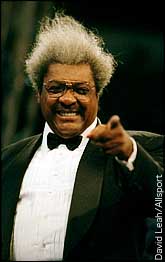 |
|
| Friday, April 23 Boxing needs a czar By Brian Kenny Special to ESPN.com |
|||||||||
|
The "that's boxing" line doesn't work anymore. You can only laugh off the corruption for so long. The time to act has begun, and hopefully, it is just the beginning.
The McCain boxing bill, modest in scope, can make a difference. It is a small, but significant step, and one that would cost nothing to the taxpayers. I can think of no reason why this bill shouldn't easily pass through Congress, except for political hacks muddying up the process. Here are the main points of the proposal, and a quick analysis, including strengths and weaknesses: 1. Limits "option contracts" to one year. ("Options" are when the promoter of the opposing fighter gets to take you over if you win. Meaning, even if you win, you lose!). Example: Evander Holyfield wants to fight Mike Tyson. Tyson's promoter, Don King, allows the fight if Holyfield signs on King for his next four fights. Strength: Limits the amount of time a promoter can sink his hooks into a guy who wants a shot at a title, or a big fight. Also eliminates any option if the fighter is a No. 1 contender/mandatory challenger. Weakness: Doesn't eliminate options altogether. Why allow any type of legalized coercion at all? While we're at it, how many fights can you squeeze into one year? 2. Prohibits a promoter from forcing a fighter to retain a manager or other employee at his expense as a condition of getting a certain fight. Strength: Carl King's managerial career is in serious jeopardy. Weakness: Difficult to enforce when the fighter with little leverage is desperate for a career-bout. 3. Makes sanctioning bodies more accountable for ratings, explaining any and all changes in rankings. Strength: WBA and WBC will have to hire vast public relations firms to come up with something in trying to explain how John Ruiz and Henry Akinwande earned their No. 1 heavyweight ranking. Weakness: Sanctioning bodies have never been shy about lying bodaciously before. Now they'll just have to post it on the Internet. 4. Requires a sanctioning body to "open the books" to state commission. Example: Tim Witherspoon claims Don King had him pay training expenses, taking huge chunk out of purse. Strength: Stops promoters from legally stealing from fighters with little business savvy. Weakness: Two sets of books. By pointing out the loopholes, I am only showing the limited nature of the bill itself. It is, however, more than we have right now. It can only help. Wally Matthews of the New York Post, testifying to the Senate Commerce Committee on Thursday, put it best: "The Ali Boxing Reform Act is only as good as the people who enforce it." To make it really work, Matthews said, you have to "beef up your police force, and that's the state athletic commissions." Wally didn't go far enough. Of course, to do so would've required him physically throwing out one of the other invited panelists.
IBF follies So who invited Walter Stone? Listed as "counsel" for the IBF, he managed to waste everyone's time with his personal synopsis of the Lewis-Holyfield decision. In regard to rankings, Stone said "We've recognized what the problems are, and we've moved to try and correct them." Hey, Walter, was that before, or after the feds began their investigation of the IBF for ratings manipulation? This man was actually in our nation's capitol talking about the boxing reform while a federal grand jury is preparing indictments on his organization for basically having its rankings up for sale. Incredible, and inexcusable.
Worthwhile hearing Muhammad Ali was brought in for name value. Mills Lane had insight into removing the sanctioning bodies from the judging. Greg Sirb, president of the Association of Boxing Commissions, is best qualified to speak of reform. He is the closest thing there is to a boxing commissioner, and is also the state athletic director in Pennsylvania. Sirb says the ABC is going to mandate that all judges will be named by the state commissions, and "very soon." That's a good start, in light of the Holyfield disgrace. That the governing bodies (in cahoots with promoters) were able to name the judges up until this time is stunning. Sirb, though, in the hearing, spoke mainly of working within the current, tangled system. Newly elected New York State Attorney General Elliot Spitzer had a more revolutionary recommendation: to create a new panel to rank professional fighters. Doing so would bring a "new dynamic in the industry." Spitzer has the type of thinking needed to save these fighters from the sharks that currently feed on them. It was also refreshing to hear from Matthews, the Post's lead sports columnist. He has worked at ESPN, Fox, and NBC. His perspective was especially necessary because he's not mired in the details, without any vested interest, and sickened, as most of us are, by what we see on a regular basis. Matthews called for a "federal overseer" to regulate the heads of the state commissions. I'll go one further. We need a national commission, with a national commissioner. Without it, boxing will still be mired into its current barnstorming state. Last weekend on ESPN Radio, I asked Sirb about a boxing czar. He said he once thought the state commissions, working separately, could govern the sport effectively. He no longer felt that way. Limited federal regulation is necessary. A national commission should be demanded. The Ali bill is only a small step. |
| ||||||||
